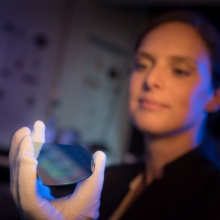Word is spreading that quantum technologies serve as a basis for extremely fast computers and for absolutely secure data transmission. Less known, however, is that these novel technologies can also be used to perform complete computations on a remote quantum server without having to divulge any information about the data or the calculations themselves. Such innovative applications are the topic of the project "Silicon photonics in secure quantum networks – SiSiQ", led by Prof. Stefanie Barz at the Institute of Functional Matter and Quantum Technologies of the University of Stuttgart. The German Federal Ministry of Education and Research is now funding the project within the "Quantum Futur" framework with 3.6 million Euros.
Digitization and networking are the basis of modern society. Nowadays, not only are IT applications outsourced to the ‘Cloud’, but also real objects are linked to one another, to form an ‘Internet of Things’. Such applications are intriguing, but they also raise the question of data and network security — aspects that are becoming of central importance both from a technological and a socio-political point of view.
The best of two worlds
Against this background, the SiSiQ project aims to develop fundamentally new concepts for secure information processing in networks. The focus is on novel methods that enable secure computations based on the rules of quantum physics. In order to achieve this, the scientists around project leader Prof. Stefanie Barz plan to bring together the best of two already established fields, quantum communication and quantum computing. Their goal is to advance photonic quantum technology and pioneer its use for secure quantum networks.
Photonic silicon technology as a basis
To do so, they will investigate and implement new types of protocols for data transmission, and will perform distributed calculations in quantum networks based on photonic systems. The latter are ideal for the problem at hand, as quantum information can be both sent and processed in photonic networks. "The essential components of our networks will be based on photonic silicon technology. We will develop efficient single-photon sources as well as integrated silicon circuits," explains project leader Prof. Stefanie Barz. "Subsequently we will use these networks to explore new possibilities for secure information processing."
The researchers will study methods for transmitting information and performing calculations in the quantum networks, initially between two network nodes, eventually between several of them. In addition, they will look at possibilities how these networks might be ‘hacked’ — one of several important aspects with a view to utilizing the results of this project in commercial applications.
Bright minds for challenging research topics
The “Quantum Futur” scheme is a measure of the "Photonics Research Germany" funding initiative launched by the Federal Ministry of Education and Research (BMBF). Its goal is to support excellent young scientists to advance the transition from basic research findings to novel applications.
The SiSiQ project will involve PhD students and postdocs, but also Bachelor and Master students can participate in graduation projects. The SiSiQ project will be funded for five years, starting from 1 September 2018. It is one of around ten projects across Germany being successful in the latest round of funding.
Expert Contact:
Prof. Dr. Stefanie Barz, University of Stuttgart, Institute of Functional Matter and Quantum Technologies and Center for Integrated Quantum Science and Technology IQST, Tel.: +49 (0)711/685 65254, E-Mail
Mehr zu Prof. Stefanie Barz: www.barzgroup.de, www.stefaniebarz.de; Twitter: @StefanieBarz
Mehr zum IQST: www.iqst.org


